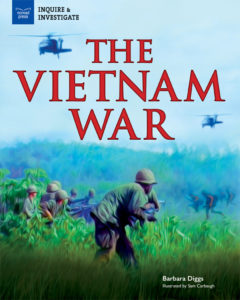The Vietnam War
Barbara Diggs
Published May 1st, 2018 by Nomad Press
Summary: More than 58,000 American troops and personnel died in the humid jungles and muddy rivers of Vietnam during the 20-year conflict. But why? What were they fighting for? And how could the world’s most powerful military be defeated by a small, poverty-stricken country?
In The Vietnam War, kids ages 12 to 15 explore the global conditions and history that gave rise to the Vietnam War, the reasons why the United States became increasingly embroiled in the conflict, and the varied causes of its shocking defeat. The Vietnam War also pays close attention to the development of a massive antiwar movement and counterculture that divided the country into “hawks” and “doves.” As middle schoolers learn about how the fear of the spread of communism spurred the United States to enter a war that was erupting on the other side of the world, they find themselves immersed in the mood and mindset of the Vietnam Era.
About the Author: Barbara Diggs is a non-fiction writer who has written a range of historical articles for children. Her work has been featured in Learning Through History Magazine, History Magazine, and Renaissance, among others. A graduate of Stanford Law School, Barbara practiced law in New York for several years before becoming a professional writer. She and her family currently split their time between Paris, France, and Washington DC.
Author Guest Post:
“Lessons of Past Wars”
For a kid, the Vietnam War might seem like it happened a long time ago. That was way back in the last century! But even if the war itself seems far off, understanding the lessons of the Vietnam war–and events of the era–is key to understanding current events.
In the 1950s, the communist country of North Vietnam was trying to bring South Vietnam under unified rule. The United States stepped in to support South Vietnam. The American government was worried that if communism was allowed to spread unchecked, it could eventually reach its own shores and threaten America’s free, democratic way of life. The United States was also concerned that the Soviet Union, a communist country and the United States’s ideological enemy, supported North Vietnam.
The war lasted for nearly 20 years and more than 58,000 American soldiers died. As the war dragged on, American youth formed a massive antiwar protest movement that defined a generation, created a deep rift in the nation, and profoundly impacted both the course of the war and American culture. To complicate matters further, political and military leaders proved themselves to be less than truthful about several crucial aspects of the conflict, leading to a widespread erosion of the public’s trust in the government.
Though long ago, this history is still relevant today. In my book, readers will recognize echoes of the Vietnam War era in the political protests, marches and movements of today, and will explore the different ways in which the youth of that generation made their voices heard. They’ll also learn to identify propaganda, analyze the role the media plays in influencing public opinion, and consider the balance between national security and the public’s right to information…all still hugely relevant topics today.
Not least of all, kids will look at the realities of war and recognize our shared humanity.
This war was the most bitter of conflicts. The loss of life and suffering that occurred on all sides was terrible. And yet today, the United States and Vietnam have a friendly relationship, despite Vietnam having a communist government. This perspective is something that’s especially important to learn and remember in these polarizing times: today’s enemy might be tomorrow’s friend.
Teachers’ Tools for Navigation:
War still rages around the world, and the lessons we return to again and again only get more and more important. Here are a few activities featuring the Vietnam War that can serve as a jumping-off point for developing the critical-thinking skills kids will need as future leaders!
DEAR HOME
The Vietnam War was a terrifying, life-changing experience for the soldiers who fought there. The estimated average age of a soldier was 22 years old, and 61 percent of those who died were under 21. Many soldiers in Vietnam wrote to their families as often as possible and loved receiving letters in return. Being able to write home and receive letters helped them stay connected to the outside world and document their experiences.
Read some letters and excerpts of letters written by soldiers in Vietnam.
After you read or listen to them, consider the following questions.
- What were the reasons some of these men went to Vietnam?
- What are some of the different tones and emotions expressed in the letters?
- What surprises you about the letters?
- How did the letter writers’ experiences differ? How were they similar?
Imagine that you are a combat soldier in Vietnam. Write a letter or email home discussing your experiences. What would you want to talk about? What would you want to know about back home?
To investigate more, imagine that you are a South Vietnamese peasant during the war who was evacuated because of the Vietcong threat. Write a letter to a relative outside of Vietnam describing what wartime life is like. How do you feel about the Vietcong? How might you feel about the United States? What are your fears?
MUSIC OF THE VIETNAM ERA
As the Vietnam War escalated, folksingers began expressing their condemnation of the war through music. These songs expressed the emotions and frustrations that many were feeling, and promoted a sense of unity in a highly divisive time. Singers such as Bob Dylan (1941– ), Phil Ochs (1940–1976), Joan Baez (1941– ), Arlo Guthrie (1947– ), and Barry McGuire (1935– ) were among the leading artists of the era. They became legends for their Vietnam era music and lyrics.
Search for Vietnam protest songs and listen to examples of anti-war music from this time.
- Consider the following questions.
- What are some of the different messages the songs tried to convey?
- What different emotions did each song appeal to?
- In what ways might these songs have influenced youth behavior?
- Can you name any modern songs that relate to today’s political or social issues? What topics do they cover?
Write your own song or poem that expresses feelings and opinions about a current political or social concern.
- What point of view will you write from?
- What images will you use to get your point across?
- How will you use rhythm to convey meaning or emotion?
To investigate more, imagine that you live during the Vietnam era and want to show your support for the war. Create a slogan to put on a placard or banner. Who would be your intended audience? What message would you want to deliver? If you were against the war, what would you come up with?
BLOWING THE WHISTLE
Daniel Ellsberg, the man who leaked the top-secret Pentagon Papers to newspapers, was the first major whistle-blower of the modern era. A whistle-blower is defined as a person who informs on a person or organization believed to be engaging in immoral, unethical, or illegal behavior. Whistle-blowers are usually protected by federal law, so they can report unethical actions without fear of getting into trouble. But such laws generally don’t protect those who reveal classified government information. Ellsberg did so knowing he could be jailed for life. Some Americans regarded him as a hero, while others viewed him as a traitor.
- In what ways can whistle-blowing be beneficial to society?
- In what ways can whistle-blowing be detrimental to society?
- Do you think Ellsberg was a hero or a traitor? Explain.
- Are there any circumstances where you might view a whistle-blower as the opposite of the
- answer you provided above? Describe.
You can learn more about recent government whistle-blowers by researching Edward Snowden and Chelsea Manning. Create a two-column, seven-row chart that compares and contrasts one whistle-blower with Daniel Ellsberg. Use the following questions as a guide.
- How were the circumstances of each whistle-blower similar?
- What were key differences in their situations?
- What motivated each of them?
- How did each of them reveal classified information?
- What consequences did they suffer?
- How were they perceived by the public?
- Do you view one of them more favorably than the other? Why?
To investigate more, imagine that you have learned of an immoral, unethical, or illegal act that a person in authority, such as a teacher or club leader, is committing. Map out three different ways you could respond to the situation. Consider whom you might tell, evidence you might need, the potential consequences you might face, and the possible consequences of doing nothing. Of the three, which response would you be most likely to take?
Find more resources in the free classroom teaching guide!
Thank you so much, Barbara and Nomad Press!


